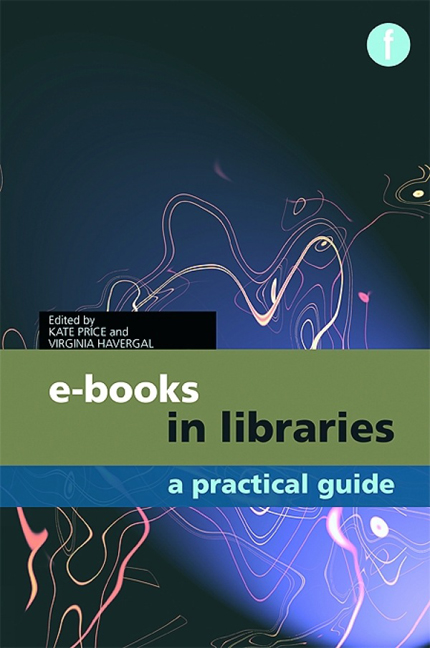Book contents
- Frontmatter
- Contents
- Preface
- The contributors
- Editors’ note
- Introduction
- Part 1 The production and distribution of e-books
- Part 2 Planning and developing an e-book collection
- 5 E-books for public libraries
- 6 E-books for further education
- 7 E-books for higher education
- Part 3 Delivering e-books to library users
- Part 4 Engaging readers with e-books
- Part 5 The future of e-books
- Part 6 Useful information
6 - E-books for further education
from Part 2 - Planning and developing an e-book collection
Published online by Cambridge University Press: 08 June 2018
- Frontmatter
- Contents
- Preface
- The contributors
- Editors’ note
- Introduction
- Part 1 The production and distribution of e-books
- Part 2 Planning and developing an e-book collection
- 5 E-books for public libraries
- 6 E-books for further education
- 7 E-books for higher education
- Part 3 Delivering e-books to library users
- Part 4 Engaging readers with e-books
- Part 5 The future of e-books
- Part 6 Useful information
Summary
Introduction
In this chapter, we consider the background to the development of an ebook collection within the FE sector. The themes of the chapter include how e-books fit in with a growing emphasis on using technology to enhance learning across the sector, the ways in which an e-book collection can be developed and managed, budgeting for e-books and finally the potential impact on staffing.
Throughout, we will be using examples from Yeovil College, a tertiary college providing post-compulsory FE opportunities to around 7000 learners from South Somerset and North Dorset in the UK. The college has two main campuses situated in Yeovil, the Further Education campus and University Centre Yeovil (UCY), which focuses on HE. There are also two off-site locations, North Dorset Skills Centre and Lufton Construction Centre. The college offers academic qualifications ranging from diplomas aimed at 14–16 year olds up to first degree level, as well as vocational courses, apprenticeships and courses aimed at adults in the workplace.
Using technology to enhance learning
In 2005 the UK Government produced Harnessing Technology: transforming learning and children's services, a report highlighting the ways in which technology can enhance the work of the education sector (Department for Education and Skills, 2005). It fostered an expectation that colleges would embrace many types of digital technology and ensure that all learners have the opportunity to access e-resources as part of their educational experience, particularly in order to direct and manage aspects of their own learning.
More recently, the strategy was reviewed and revised by Becta, the government agency responsible for promoting innovative use of technology in learning, resulting in two reports: Harnessing Technology: next generation learning 2008–14 (Becta, 2008) and Harnessing Technology Review 2009: the role of technology in further education and skills (Becta, 2010). These reports conclude that the need to use technology in education remains, although some issues have been identified with the transition of young learners from a school setting to a FE setting where technology is more central to independent study.
Gunter et al. (2009) identify differences in attitude towards technology between the Google Generation, which was born after 1994 and has therefore been brought up in the internet era, Generation Y (born between 1978 and 1993) and Generation X (born prior to 1978).
- Type
- Chapter
- Information
- E-books in LibrariesA practical guide, pp. 93 - 116Publisher: FacetPrint publication year: 2011



